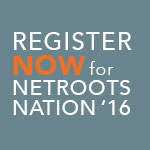After a great run, the Winning the Internet blog has been retired. However, you can still keep in touch with New Media Mentors here.

Alan Jenkins

Julie Fisher-Rowe
As we get ready for Netroots Nation 2014, we’re taking a closer look at some of the convention’s most exciting training sessions. We’re interviewing the trainers and taking you inside some of online activism’s most popular and elusive topics.
Today we’re interviewing Julie Fisher-Rowe of The Opportunity Agenda, who’ll be leading Vision, values, voice: Building powerful messages to win with Alan Jenkins.
NN14 Training Session
Vision, values, voice: Building powerful messages to win
If you’ve read anything on political messaging lately, you know you’re supposed to be talking about values and perfecting the art of storytelling. But what does that mean? This workshop provides concrete structures for building powerful and resilient values-based messages that will take on tough issues and cut through the communications clutter. Based on communications theory and research and the experience of advocates and activists around the country, our values-based approach will help communicators think through their messaging strategy, segment audiences and identify concise, effective language to move your issue forward.
Interview
Q: Tell us about yourself and your experience with storytelling.
A: I’ve been working in social justice storytelling and messaging for 15 years, working in issues such as human rights, health, immigration, racial justice, and criminal justice. For the past eight years, I’ve worked at The Opportunity Agenda to help advocates think through their messaging strategies using public opinion and media research, communications principles, framing theories, and their peers’ and their own experience.
Q: In your opinion, why is values-based storytelling important?
A: In the political and advocacy realm, the goal of storytelling is persuasion – moving strategic audiences toward the mindsets and positions we need to get the policies we know will make a difference in people’s lives. Given that goal, it’s important to understand that research and experience show that people are not persuaded by facts-based arguments alone, which is a common messaging strategy among progressives. Facts and statistics are important, but they are not sufficient.
People will often disregard, argue with, or simply discard any facts that don’t fit with their existing thinking about an issue. Instead, we need to connect to audiences first through shared values. These are the core principles and ideals that we share with our audiences, and that guide all of our thinking, and more importantly, our feelings, about social issues. By connecting at this level, we can give audiences a comfortable, or at least familiar, place to start their thinking. We can also jar them out of some of predictable and problematic ways they may currently view the issue.
For instance, in the case of immigration, we have observed in various public opinion research projects that many audiences, even those screened to be persuadable or sympathetic, start from a place of ambivalence about undocumented immigrants. On one hand, they are hoping for a solution that would create a roadmap to citizenship, but on the other, they are worried about what they perceive as job shortages among low wage workers or an overwhelming of school systems.
By approaching these audiences through a values framework – talking about community, the idea that we are all in this together, that participation and contribution are better for all of us than division and exclusion — we can get move the conversation further than by throwing a lot of statistics at them about how immigrants don’t take American jobs, or legal arguments about how we must educate everyone here. Priming the audience with values that they share and understand helps to create an atmosphere in which they can better hear, understand, and agree with our position.
Q: What are the two most important things to keep in mind when developing political messaging?
A: 1) Identify, segment, and understand your audiences. This is a critical strategic step that we skip way too often. And 2) understand the current conversation – the values driving it, the underlying narratives, if it helps or hurts your cause, openings to introducing your point, and barriers to moving audiences in your direction.
Q: Why should folks attend your session at Netroots Nation, and how can they connect with you?
A: We offer concrete and clear ideas about how to build social justice messages that are tailored to strategic audiences and that will stand up to both short-term and long-term challenges and tests. You can connect with me, @JulieFisherRowe, and my co-presenter, @Opportunity1 on Twitter.
To attend this training, or one of the 39 others at Netroots Nation 2014 in Detroit, register now.




Comments are closed.